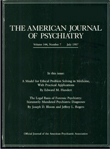Relationship Between Acute Stress Disorder and Posttraumatic Stress Disorder Following Mild Traumatic Brain Injury
Abstract
OBJECTIVE: The aim of this study was to index the frequency of occurrence of acute stress disorder following mild traumatic brain injury and to determine its utility in predicting posttraumatic stress disorder (PTSD). METHOD: Consecutive adult patients who sustained a mild traumatic brain injury following a motor vehicle accident (N=79) were assessed for acute stress disorder within 1 month of their trauma with the Acute Stress Disorder Inventory, a structured clinical interview based on DSM-IV criteria. Patients were followed up 6 months after the trauma (N=63) and were administered the PTSD module of the Composite International Diagnostic Interview. RESULTS: Acute stress disorder was diagnosed in 14% of patients, and at follow-up 24% satisfied criteria for PTSD. Six months after the trauma PTSD was diagnosed in 82% of patients who had been diagnosed with acute stress disorder and in 11% of those who had not been diagnosed with acute stress disorder. CONCLUSIONS: These findings point to the frequency of PTSD following mild traumatic brain injury. While the criteria for acute stress disorder are useful in identifying those individuals who are at risk of developing chronic PTSD, the findings suggest that current criteria require modification in order to optimally predict PTSD following mild traumatic brain injury.



